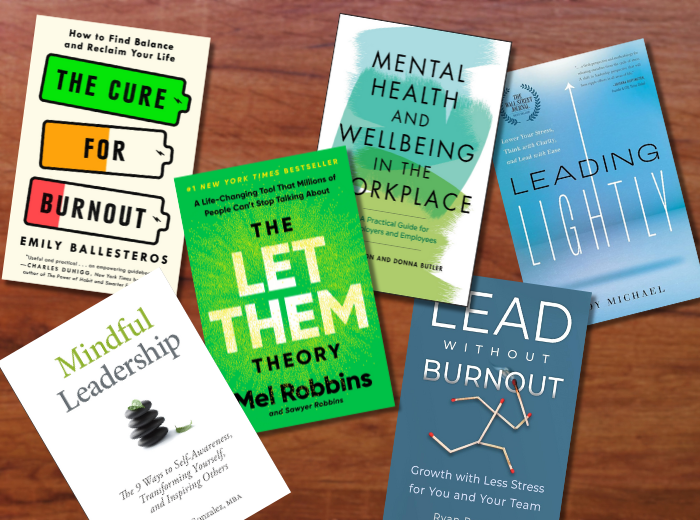
For Mental Health Awareness Month, the Corridor Business Journal asked the Cedar Rapids Public Library to recommend books that address burnout, workplace well-being, and mindful leadership. Materials Librarian Allison Zordell curated this thoughtful list, which offers practical strategies and fresh perspectives for managing stress, supporting mental health, and fostering healthier work environments. Whether you’re an individual seeking balance or a leader striving to support your team, these titles provide valuable guidance for building a more sustainable and fulfilling professional life.
–Alexandra Olsen
“The Cure for Burnout: How to Find Balance and Reclaim Your Life” by Emily Ballesteros offers a compassionate approach to overcoming burnout, focusing on the importance of self-care, boundary-setting, and emotional well-being. Ms. Ballesteros explains that burnout can result from constant stress and a lack of balance while providing practical strategies to help individuals recharge and regain their energy. The book emphasizes the power of mindfulness, rest, and seeking support to prevent burnout and achieve a more sustainable, fulfilling life.
“The Let Them Theory” by Mel Robbins advocates for the empowering approach of stepping back and allowing others to control their own decisions, instead of constantly intervening or micromanaging. Ms. Robbins argues that genuine growth and resilience come from letting people make their own mistakes and learn from them, whether in the workplace or in personal relationships. By fostering autonomy and trust, this book highlights how this mindset can lead to stronger, more confident individuals and healthier, more collaborative environments.
“Lead Without Burnout: Growth with Less Stress for You and Your Team” by Ryan Renteria presents a practical guide for leaders aiming to nurture growth while avoiding burnout, both for themselves and their teams. Mr. Renteria provides strategies to minimize stress, enhance productivity, and cultivate a healthier work environment by prioritizing well-being and sustainable practices. The book stresses the significance of self-awareness, communication, and boundary-setting in leadership. By emphasizing mindful leadership and effective team dynamics, Mr. Renteria enables readers to build thriving, high-performance teams without sacrificing mental health or personal balance.
“Mindful Leadership: The 9 Ways to Self-Awareness, Transforming Yourself, and Inspiring Others” by Maria Gonzalez explores how mindfulness can improve leadership effectiveness and personal growth. Ms. Gonzalez outlines nine key practices for developing greater self-awareness, emotional intelligence, and focus, which in turn help leaders inspire and motivate their teams. The book highlights the necessity of being present, cultivating empathy, and managing stress to create a positive and productive work environment. Through practical exercises and insights, Mindful Leadership demonstrates how leaders can transform themselves and their organizations by embracing a mindful approach to leadership.
“Mental Health and Wellbeing in the Workplace: A Practical Guide for Employers and Employees” by Gill Hasson and Donna Butler covers the significance of mental health within professional settings. The book provides guidance on promoting mental well-being, implementing effective workplace strategies, managing stress, and supporting employees facing mental health challenges.
“Leading Lightly: Lower Your Stress, Think with Clarity, and Lead with Ease” by Jody Michael introduces a transformative approach to leadership, emphasizing the significance of mental fitness, emotional intelligence, and mindfulness. The book outlines five essential “muscles” of mental fitness — personal accountability, helpful beliefs, self-assessment, multiple perspectives, and physiological regulation — to aid leaders in managing stress, enhancing clarity, and leading with greater ease. Drawing on over 25 years of research and practice, Ms. Michael presents actionable strategies for developing these skills, aiming to promote improved decision-making, increased self-awareness, and a more balanced, fulfilling professional life.